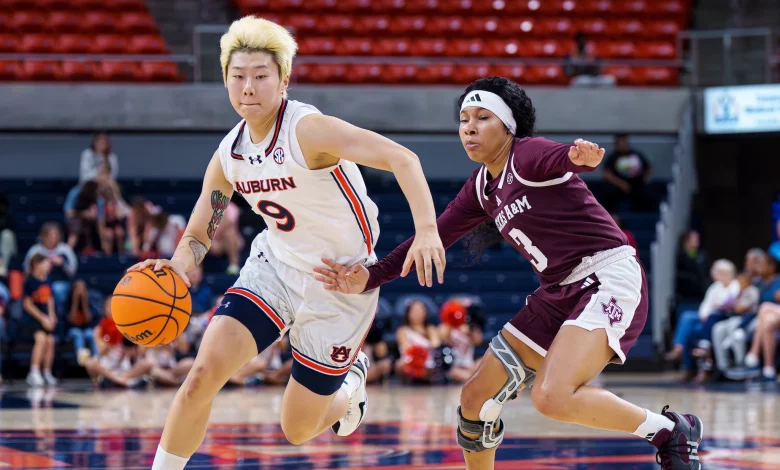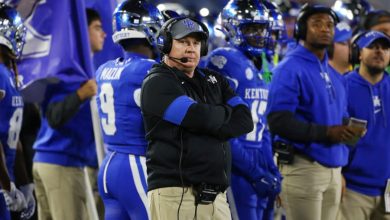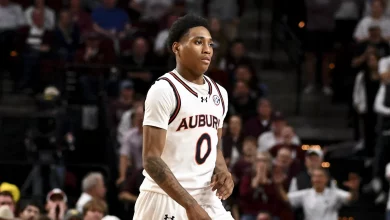Despite Deng’s career-high, Auburn loses against Vanderbilt in overtime.

The excitement of college basketball is often defined by its unpredictability. For Auburn fans, the highs of exhilarating victories and the lows of heartbreaking defeats are a part of the rollercoaster ride that comes with being a fan of a competitive team. On February 18, 2025, the Auburn Tigers experienced the latter as they suffered a devastating overtime loss to Vanderbilt, despite a career-high performance from their star player, Musa Deng.
Deng, who had been having an outstanding season, played arguably his best game yet, putting up a career-high in points and showing why he has been one of the most talked-about players in the Southeastern Conference (SEC). Yet, despite his individual brilliance, Auburn fell short in a 79-75 defeat in a game that was as emotional as it was dramatic. The loss was a blow to Auburn’s hopes of securing a favorable seed in the upcoming NCAA tournament and left fans wondering how such a brilliant individual performance could go in vain.
This article delves into Deng’s historic performance, the key moments of the game that led to Auburn’s loss, and the implications of this defeat for both the Tigers’ season and the wider SEC race.
Deng’s Career-High Performance
Musa Deng, a 6-foot-8 forward from Birmingham, Alabama, had been a breakout player for Auburn during the 2024-2025 season. A skilled scorer with a versatile game, Deng had earned a reputation for his ability to stretch the floor, score inside and outside, and provide solid defense. Known for his work ethic and leadership on the court, Deng had quickly become Auburn’s go-to player and was often relied upon in clutch moments.
On this particular night, Deng was in a zone like never before. From the opening tip, it was clear that he was on a mission. His offensive game was clicking from every angle. Whether he was hitting mid-range jumpers, knocking down three-pointers, or using his strength to finish through contact in the paint, Deng was unstoppable. His confidence was palpable, and it was evident that Auburn was riding his hot hand to try to secure an important win.
Deng finished the game with an incredible 34 points, a career-high that not only led Auburn in scoring but was also a significant contribution to the Tigers’ offense. He shot 13-of-22 from the field, including 4-of-7 from three-point range, and grabbed 8 rebounds. His performance was a tour de force, especially when considering the importance of the game.
Beyond just scoring, Deng was also a force on the defensive end, picking up two steals and a block, showing the full range of his talents. He kept Auburn in the game through a combination of individual brilliance and leadership, especially in the second half when the game was tightly contested. His ability to stay aggressive and assert himself on both sides of the ball was a key reason Auburn was able to push Vanderbilt to overtime.
Despite all of Deng’s efforts, however, his individual heroics could not prevent the Tigers from falling short when it mattered most.
The Game Unfolds: Early Success and Late Collapse
The game against Vanderbilt was a back-and-forth affair that had both teams on edge from start to finish. Auburn came into the contest with a sense of urgency, needing a win to boost their resume for the NCAA tournament. Vanderbilt, on the other hand, had been playing strong basketball lately and was hoping to make a statement of their own. The energy in the building was palpable, with both fan bases bringing the intensity of a must-win game.
First Half: A Solid Start
Auburn got off to a strong start in the first half, with Deng leading the charge. He was firing on all cylinders, knocking down jumpers and dominating inside. Auburn’s offense looked fluid, with point guard Kai Rucker setting up plays and getting the ball to Deng in positions where he could exploit Vanderbilt’s defense. By the 10-minute mark of the first half, Auburn had built a 10-point lead, with Deng scoring 14 of Auburn’s first 20 points.
Vanderbilt, however, wasn’t intimidated. Behind the play of guard Scottie Burns, who had 12 points in the first half, the Commodores clawed their way back into the game. Burns was able to consistently break down Auburn’s defense, drawing fouls and dishing out assists, helping his team narrow the gap.
Despite some shaky moments in the second half, Auburn’s offense continued to revolve around Deng. His hot hand was complemented by Chris Moore, who contributed 8 points and played solid defense, helping to keep Vanderbilt at bay. By halftime, Auburn held a narrow 39-36 lead, but it was clear that Vanderbilt was not going to roll over easily.
Second Half: A Tense Battle
The second half was a tense back-and-forth affair, with both teams exchanging blows. Auburn struggled to find consistent scoring outside of Deng, and it showed. When Deng was on the bench or off the floor, Auburn’s offense sputtered. Meanwhile, Vanderbilt began to find its rhythm. Burns continued his impressive play, but it was forward Mason Williams who became a major factor, contributing timely buckets and grabbing key rebounds.
The game remained tight, with neither team being able to gain a significant advantage. Auburn’s defense, which had been solid throughout most of the season, began to show cracks as the game wore on. Vanderbilt’s offense began to exploit Auburn’s defensive lapses, especially in pick-and-roll situations. Williams was able to score easily in the paint, and Burns continued to attack the basket, putting pressure on Auburn’s defense.
Auburn’s inability to contain Vanderbilt’s ball movement and rebounding in the second half allowed the Commodores to tie the game at 72-72 in the final seconds of regulation. With less than 30 seconds remaining, Auburn had a chance to win the game in regulation, but Deng’s last-second shot fell short after a contested drive to the basket. The Tigers’ poor execution in the final moments of regulation led to the game heading to overtime.
Overtime: Vanderbilt’s Poise Seals the Win
Overtime proved to be the ultimate test of composure for both teams. With the game knotted at 72-72, Auburn’s energy appeared to dip as they struggled to match Vanderbilt’s intensity in the extra period. The Commodores, led by Burns and Williams, came out aggressive, taking control of the pace early on. Burns knocked down a clutch three-pointer to start overtime, and Williams followed with a quick basket off an offensive rebound, giving Vanderbilt a 77-72 lead.
Auburn had opportunities to cut the lead, with Deng continuing to attack the basket and forcing fouls. However, the Tigers struggled to convert at the free-throw line, shooting a mere 60% from the charity stripe during the game, which was one of their major weaknesses throughout the night. With time running out, Auburn’s attempts to close the gap came too late, and Vanderbilt held on for a 79-75 victory.
While Deng’s individual performance was spectacular, it was clear that Auburn’s inability to execute in key moments, particularly on defense and at the free-throw line, cost them the game.
The Breakdown: Key Factors in the Loss
Several key factors contributed to Auburn’s disappointing loss to Vanderbilt, despite Deng’s career-high performance:
- Lack of Scoring Depth: While Deng’s 34 points were remarkable, Auburn struggled to find consistent scoring from other players. Outside of Deng and Moore, no other player reached double figures in scoring. This lack of offensive depth was a major concern for Auburn, especially in critical moments when they needed another scorer to step up.
- Defensive Lapses: Auburn’s defense, which had been one of their strengths all season, faltered late in the game. They allowed Vanderbilt to score easily in transition and gave up crucial offensive rebounds in the second half and overtime. The Tigers failed to make necessary adjustments to stop the hot hand of Burns or to contain Williams in the paint.
- Free-Throw Shooting: Auburn’s struggles at the free-throw line were glaring, especially in a close game. The Tigers shot just 14-of-22 from the free-throw line (63.6%), missing key opportunities to extend their lead or close the gap in the final moments. In a game where every point mattered, Auburn’s inability to capitalize on free throw opportunities proved costly.
- Lack of Execution in Clutch Moments: The Tigers had several chances to win in regulation and overtime but failed to execute down the stretch. From Deng’s missed game-winning drive to missed free throws and a lack of defensive stops, Auburn simply could not execute when it mattered most.
The Aftermath: What This Loss Means for Auburn
The loss to Vanderbilt, though heartbreaking, is not the end of Auburn’s season. The Tigers still have the talent and coaching to make a deep run in both the SEC tournament and the NCAA tournament. However, this defeat serves as a reminder of the challenges Auburn faces as they prepare for postseason play. If they hope to make a serious tournament run, the Tigers will need to address several issues, including improving free-throw shooting, developing more scoring depth, and tightening up defensively in high-pressure situations.
For Deng, this career-high performance will likely only enhance his reputation as one of the SEC’s top players. While the loss was disappointing, it highlighted just how capable Deng is of carrying Auburn on his shoulders. If the Tigers can rally around him and fix their shortcomings, they still have the potential to make a significant impact in March Madness.
In conclusion, while Deng’s 34-point outburst was a shining individual achievement, Auburn’s inability to close out the game and execute in critical moments cost them dearly. The Tigers will need to regroup quickly as they prepare for
the next challenges in their SEC and NCAA journey.









